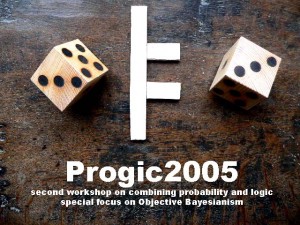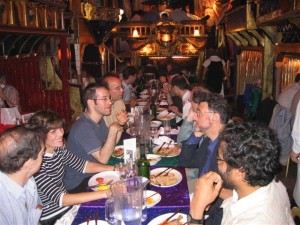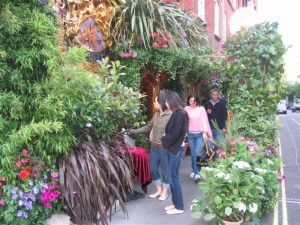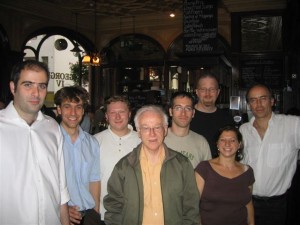 Special focus: Objective Bayesianism
Special focus: Objective Bayesianism
6th-8th July 2005
Room S50, London School of Economics
Introduction
There is a clear connection between probability and logic: both appear to tell us how we should reason. But how, exactly, are the two concepts related? Objective Bayesianism offers one answer to this question. According to objective Bayesianism, probability generalises deductive logic: deductive logic tells us which conclusions are certain, given a set of premises, while probability tells us the extent to which one should believe a conclusion, given the premises (certain conclusions being awarded full degree of belief). According to objective Bayesianism, the premises objectively (i.e. uniquely) determine the degree to which one should believe a conclusion.
The aim of this workshop is to explore the connections between probability and logic, and in particular to evaluate aspects of the connection forged by objective Bayesianism. The workshop is intended to be interdisciplinary: the themes of the workshop are relevant to mathematicians, logicians, philosophers, computer scientists, statisticians, psychologists and engineers, for example.
Selected papers will be published in a special issue of the Journal of Logic, Language and Information.
Timetable
|
ProgrammeAuthors: if you would like a link here to an online copy of your paper, please email Jon Williamson with the URL. Wednesday 6th July
Thursday 7th July
Friday 8th July
* joint work with other authors. |
Attendance
If you would like to attend the workshop and are not a speaker, please send an email to Jon Williamson (email: j.williamson) at the London School of Economics (lse.ac.uk), giving
your name,
your affiliation,
a very brief statement of your interest in the workshop,
please also say whether you would like to attend the conference meal on 6th July (at a local restaurant)
Attendance is free.
Objective Bayesianism
A discussion of the challenges facing objective Bayesianism can be found here. Relevant books include:
- E.T. Jaynes, 2003, Probability theory: the logic of science (Cambridge University Press)
- J.B. Paris, 1994, The uncertain reasoners companion: a mathematical perspective (Cambridge University Press)
- Roger D. Rosenkrantz, 1977, Inference, method and decision (D. Reidel)
- Jon Williamson, 2005, Bayesian nets and causality: philosophical and computational foundations (Oxford University Press).
Objective Bayesian methods are now increasingly used in statistics: non-subjective Bayesian statistical methodology.
Local Information
This is an informal workshop and participants are expected to make their own arrangements for travel, accommodation, meals etc, though we will plan a meal together on 6th July.
Accommodation
London is quite expensive for accommodation, but the following alternatives are at the lower end of the price range:
- City of London Youth Hostel – £24.60 per night bed and breakfast;
- Hotel Strand Continental – 143 Strand, London WC2R 1JA. Tel. +44 20 7836 4880. Fax. +44 20 7379 6105. Single room £32, Double room £40, Family room £50, Twin room £45, Triple room £55. Prices include breakfast. This hotel is for those who favour convenience (it is very close to LSE) and cuisine (it contains the authentic India Club restaurant) over comfort.
- Cosmo Bedford House Hotel. 27 Bloomsbury Square, London WC1 2QA. Tel. +44 20 7636 4661. Fax. +44 20 7636 0577. Email. cosmo.bedford.hotel@dial.pipex.com. From £33.
More expensive options include:
Hotel Russell, Russell Square, London WC1B 5BE. Tel. +44 20 7837 2857.
Tavistock Hotel, Russell Square, London WC1H 9EU. Tel. +44 20 7636 8383
Food
The London School of Economics has a basic canteen.
The India Club (143 Strand) serves authentic indian cuisine.
There is a Thai restaurant and a Pizza Express in the same row of buildings.
Sarastro Restaurant – 126 Drury Lane – Turkish Food – early evening ‘tenor menu’ £10
Recreation
Progic 2002
The first workshop on Combining Probability and Logic was held at King’s College London on 4th-6th November 2002, as part of the Augustus de Morgan series of workshops. It was supported by the London Mathematical Society, the British Society for the Philosophy of Science and the British Logic Colloquium. Papers were published in a special issue of the Journal of Applied Logic, volume 1(3-4), 2003.
Organisation
Progic 2005 is being organised by Jon Williamson.
I am very grateful to the British Society for the Philosophy of Science
and the LSE Centre for Philosophy of Natural and Social Science
for supporting this workshop.
This page was last updated: 28 July 2005
Photos
Thanks to Borek Puza for the following pictures:
 |
 |
 |
 |